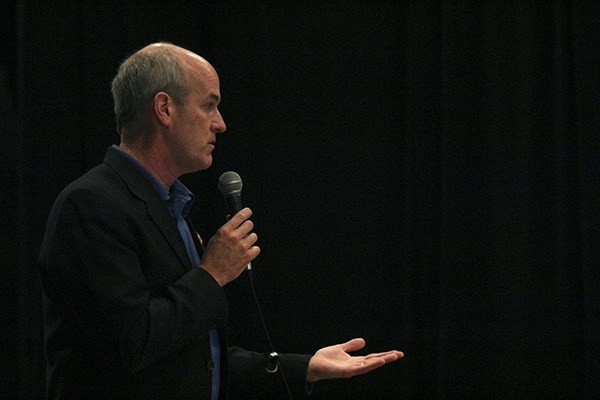She was gardening when they came. She said she could see their faces. She said it was as if she could reach up and touch the body of the jet. She said it was so loud she was knocked to the ground.
“It is degrading, humiliating and disempowering,” she said.
Nancy Koenig was one of nearly 100 people who filled the seats at Lopez Center on Oct. 7 to voice concern over the jet noise to Representative Rick Larsen.
The noise from thousands of engine tests and training runs by new EA 18G “Growlers” and other planes at Naval Air Station Whidbey and Outlying Landing Field Coupeville has generated outcry this year, mainly from Lopez Island. In June, islanders showed up at Larsen’s campaign kickoff asking him to hold a meeting on Lopez to discuss the issue.
Four months later, the congressman made his way to the island.
San Juan County Councilman Jamie Stephens opened the meeting by saying the county and the Lopez community want to work with the Navy on finding a solution.
Over the last several months the county council collected data from islanders on a jet noise complaint website and sent that information to Navy officials and Larsen.
The website received 871 reports mostly concentrated on the south end of Lopez. Two hundred and eighteen of those reports came from 6 a.m. to noon and 224 came after 9 p.m. The data also shows that 150 people reported a low rumble and 240 reported extremely loud noise.
According to Stephens, Navy officials requested that people not try to record decibels of sounds on their iPhones as it would not be accurate, but then claimed that the report was lacking this important sound data. Stephens added that the Navy made no effort in its response letter to fix the problem. The councilman then shared some possible solutions like having the Navy do sound testing in the islands, informing islanders when there would be jet noise, restricting flights over the island and having congress require the Navy to make a quieter engine.
Larsen responded that he alone does not have the power to require the Navy to make a different engine. He did say that he felt like the Whidbey base did not act as a power unto itself and Navy officials want to work with other communities.
He then outlined actions that can be taken. He noted that the Navy is currently experimenting with noise control on jets. There is a program that would automate more of the landing of aircraft and would help decrease flight tests and therefore fewer flights. Larsen said he was in the process of writing a letter to Chief of Naval Operations Admiral Jonathan Greenert to put in a budget for hush houses at the NAS Whidbey main base to reroute the noise from the revving of engines upward and thus creating less sound pollution. He also said he would try to help support getting the Navy to complete their own noise testing on the island.
“I don’t have a solution that can be done tomorrow,” he said. “But I have a list of things I am pushing for.”
When islanders took to the mic, most of them had the same two questions: do you care and are you representing us? Larsen replied that he represents a big district with different views.
Others said that Larsen had a moral responsibility to act against the Growlers. Orcas Islander David Turnoy said that Larsen was comparing different needs in the district that are not equal.
“When it comes to health and economics, one is more important than the other,” he said. “You cannot equate the quality of one’s life with economics.”
One of the last speakers, Cynthia Dilling, described her experience of noise sometimes lasting three or four hours a day for weeks on end. She said she had to garden with ear plugs. Dilling again asked if Larsen was truly representing the islands.
“It’s a balance representing this district,” he said.



